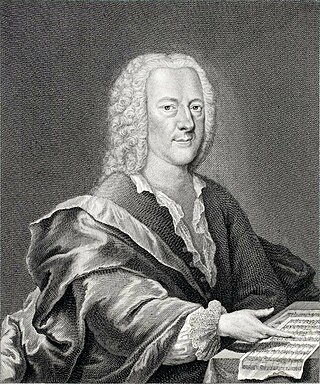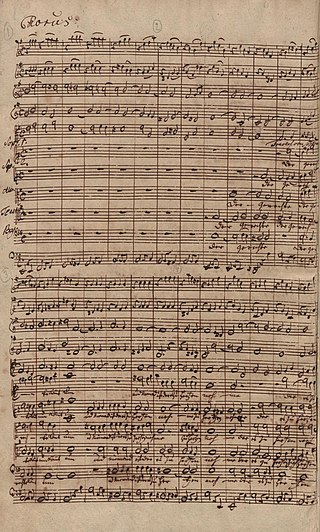External links
Sheet music
- Der Tag des Gerichts : Scores at the International Music Score Library Project
| | This article about a classical composition is a stub. You can help Wikipedia by expanding it. |
Der Tag des Gerichts (TWV 6:8) is a sacred oratorio for chorus, orchestra and continuo by Georg Philipp Telemann. Composed in 1762, the work is Telemann's final oratorio. The title of the work refers to "Judgement Day" or "The Day of Reckoning."

Georg Philipp Telemann was a German Baroque composer and multi-instrumentalist. He is one of the most prolific composers in history, at least in terms of surviving oeuvre. Telemann was considered by his contemporaries to be one of the leading German composers of the time, and he was compared favourably both to his friend Johann Sebastian Bach, who made Telemann the godfather and namesake of his son Carl Philipp Emanuel, and to George Frideric Handel, whom Telemann also knew personally.
Judgment Day is another name for the Last Judgment in the Abrahamic religions of Judaism, Christianity, and Islam
Reinhard Keiser was a German opera composer based in Hamburg. He wrote over a hundred operas. Johann Adolf Scheibe considered him an equal to Johann Kuhnau, George Frideric Handel and Georg Philipp Telemann, but his work was largely forgotten for many decades.
As Kapellmeister at Hamburg from 1768 to 1788, Carl Philipp Emanuel Bach composed 21 settings of the Passion narrative and 1 Passion oratorio.

Hamburger Admiralitätsmusik TWV 24:1 is a secular oratorio for soloists, choir and orchestra composed by Georg Philipp Telemann to celebrate the 100th anniversary of Hamburg's admiralty. It was first performed on April 6, 1723, along with Telemann's Wassermusik at a banquet for the city's merchants, sea captains, and councillors that lasted until dawn. The work is on a nautical theme and set to verses by Michael Richey, a professor at the Johanneum school in Hamburg where Telemann also taught.

Between 1716 and 1767, Georg Philipp Telemann wrote a series of Passions, musical compositions reflecting on Christ's Passion – the physical, spiritual and mental suffering of Jesus from the hours prior to his trial through to his crucifixion. The works were written for performance in German churches in the days before Easter. A prolific composer, Telemann wrote over 40 Passions for the churches of Hamburg alone, of which 22 have survived according to the present state of research. He also wrote several Passion oratorios. Unlike the Passions intended for liturgical performance, they were not closely set to the literal text of the Gospels.

The Hamburgische Kapitänsmusik refers to a body of compositions by Georg Philipp Telemann. They comprise sacred oratorios and secular serenades. However, the oratorios were intended to be performed in a secular setting, the Hamburg Drillhaus, and their characters are almost exclusively allegorical. The Kapitänsmusik was written for the annual banquet of the Hamburg militia captains. The works span the period from 1723 to 1766, although many of the manuscripts have now been lost, and in several of those years no banquet was held. Although Telemann’s grandson Georg Michael Telemann inherited many autographs and manuscript copies of Telemann’s vocal works, the rest of his musical estate, including the Kapitänsmusik, was sold at an auction in Hamburg on September 6, 1769. Much of that material has since disappeared, and the auction catalogue has not survived. Of the 36 Kapitänsmusiken that Telemann wrote, only 10 oratorios plus a few separate pieces are extant today.
Manfred Cordes is a German conductor of early music, musicologist and teacher. He is professor at the Hochschule für Künste Bremen and was its rector from 2007 to 2012.
As Thomaskantor, Johann Sebastian Bach provided Passion music for Good Friday services in Leipzig. The extant St Matthew Passion and St John Passion are Passion oratorios composed by Bach.

Der Tod Jesu is an oratorio libretto by Karl Wilhelm Ramler. In its setting by Carl Heinrich Graun in 1755, it was the most often performed Passion of the 18th century in Germany.
Opera Fuoco is a French lyrical ensemble conducted by David Stern.

Ich lebe, mein Herze, zu deinem Ergötzen, BWV 145, is a five-movement church cantata on a libretto by Picander which Johann Sebastian Bach, as its composer, probably first performed in Leipzig on Easter Tuesday, 19 April 1729. As a seven-movement pasticcio, with one of the added movements composed by Georg Philipp Telemann, it is an Easter cantata known as So du mit deinem Munde bekennest Jesum or as Auf, mein Herz!.

The Brockes Passion, or Der für die Sünde der Welt gemarterte und sterbende Jesus, is a German oratorio libretto by Barthold Heinrich Brockes, first published in 1712 and going through 30 or so editions in the next 15 years.

Wer ist der, so von Edom kömmt is a pasticcio Passion oratorio based on compositions by Carl Heinrich Graun, Georg Philipp Telemann, Johann Sebastian Bach and others. The pasticcio was assembled around 1750.
The Telemann-Werke-Verzeichnis, abbreviated TWV, is the numbering system identifying compositions by Georg Philipp Telemann, published by musicologist Martin Ruhnke.
Daniel Schiebeler was a German writer, poet, librettist and Protestant hymnwriter. He wrote librettos for operas and oratorios, set by composers such as Georg Philipp Telemann, Johann Adam Hiller and Carl Philipp Emanuel Bach.

"Ein Lämmlein geht und trägt die Schuld" is a Lutheran Passion hymn in German by Paul Gerhardt. The hymn text was first published in Johann Crüger's Praxis Pietatis Melica, starting from the lost 1647 edition. Wolfgang Dachstein's 16th-century "An Wasserflüssen Babylon" melody is commonly indicated as its hymn tune, although other settings exist.
Anne Bierwirth is a German contralto, focused on concerts and recordings of sacred music, appearing internationally. Besides the standard repertoire such as Bach's Christmas Oratorio, she has explored rarely performed Baroque music such as Bach's St Mark Passion and Reinhard Keiser's Passion oratorio Der blutige und sterbende Christus.
The Rheinische Kantorei is a German vocal ensemble of baroque music accompanied by an instrumental ensemble called Das Kleine Konzert.